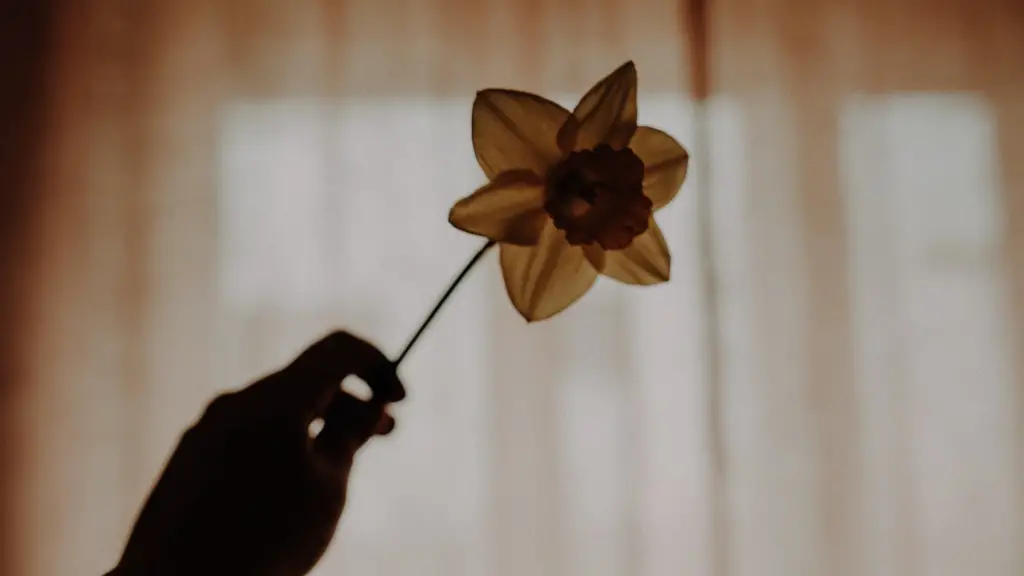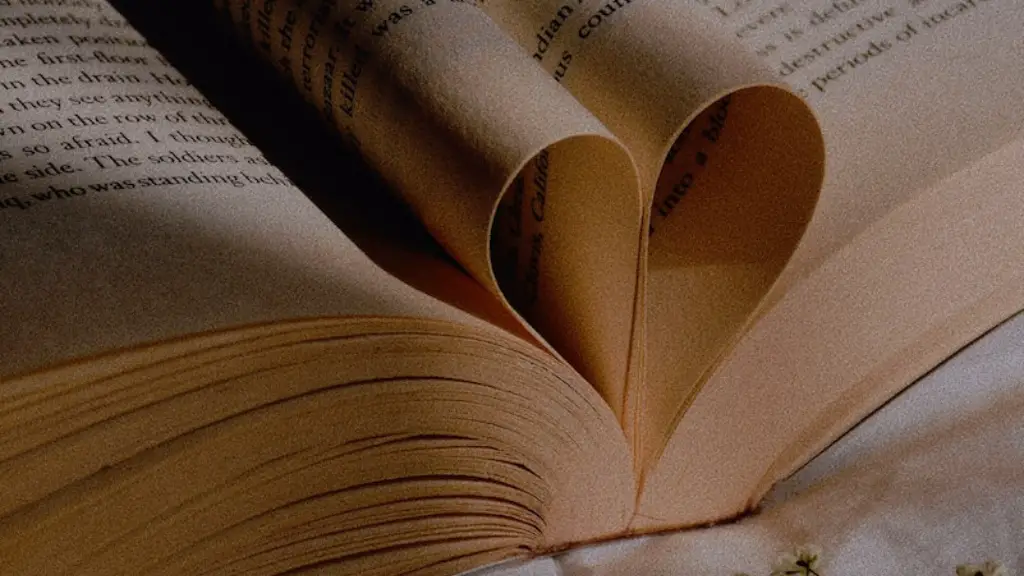Romantic poets have always placed Nature as a dominant theme in their verses. The image of Nature has been used to represent emotions and to portray a certain view of the world. Nature is often seen as being beautiful, mysterious, powerful and awe-inspiring, elements all of which are integral to the style of romantic poetry. Nature has been intertwined with other poetic elements throughout history, with metaphysical and transcendent themes often interweaving with the image of Nature. As such, Nature is seen as being both an integral part of the poet’s style and a metaphor for the experiences of humans in life.
The idea of Nature being a dominant theme in romantic poetry has a long history. The Romantics, broadly speaking, sought to explore the experience of the individual in relation to Nature and the world around them. In particular, many romantic poets celebrated the sublime and sought to highlight the physical beauty of Nature and its power. William Wordsworth, for example, often wrote about the beauty of Nature, depicting it as a source of emotion and offering a sense of transcendence to his readers. By contrast, other romantic poets, like Percy Bysshe Shelley, often explored Nature in a more metaphysical sense, exploring its mystery and the ways in which it could symbolise the individual’s own innermost feelings and deep human truths. Thus, Nature could be seen as a way to express emotion, a way to contemplate the beauty of the world, and an inspiration for the sublime.
The idea of Nature being a dominant theme in romantic poetry has had a wide influence on subsequent literary movements. Many poets, including Charles Baudelaire and T.S. Eliot, have explored themes of Nature, often in order to explore the concepts of beauty, mortality, and the sublime. While Baudelaire sometimes employed a more scientific approach, Eliot often sought to portray a sense of the power of Nature, in particular its cyclical patterns. These poets have used Nature to explore mortality and to search for an understanding of the human experience in relation to the environment. Thus, Nature has been used as a tool for both exploring the human condition and engaging in discourse about the environment.
The idea of Nature being a dominant theme in romantic poetry has also been reflected in modern literature. Authors like D.H. Lawrence, for example, have used Nature as a way to explore the deeper meanings of the human experience in life. Lawrence often employed the image of Nature to explore themes of mortality, human suffering, and the power of love. Similarly, many poets, such as Robert Frost, have used Nature to explore human emotions, to contemplate the beauty of the world, and to offer a sense of transcendence. Nature thus offers an avenue to explore humanity through the lens of Nature, and often serves as a metaphor for the experience of life.
Evolution of Nature in Romantic Poetry
The image of Nature in romantic poetry has evolved over time, reflecting different perspectives and changing social norms. In the 19th century, for example, the depiction of Nature often emphasised the beauty and power of the natural world. This was exemplified by the works of Wordsworth and Shelley, who both employed Nature to explore the sublime and to emphasise the fragility of human existence. This view of Nature as powerful and malleable to human emotion has continued in 20th century poetry, though often in a more nuanced way.
In particular, the 20th century saw a movement away from a veneration of the power of Nature to a more critical examination. Poets, like Wallace Stevens and W.B. Yeats, explored the darker aspects of the human experience, in particular themes of mortality, death, and the fears associated with life. Similarly, more contemporary poets, like Elizabeth Bishop and Robert Frost, have used Nature to explore more personal themes and to highlight the individual’s experience in life. Thus, the idea of Nature being a dominant theme in romantic poetry has evolved over time, reflecting different perspectives and changing social norms.
Analysis of Nature in Romantic Poetry
The idea of Nature being a dominant theme in romantic poetry is often seen as a reflection of the poet’s innermost thoughts and emotions. By exploring themes of Nature, poets can offer a unique perspective on the beauty of the natural world, on mortality, and on the human experience in life. In particular, the image of Nature has been used to emphasise the fragility of life, to search for transcendence, and to explore the deeper mysteries of existence.
At the same time, Nature has been used as a tool for engaging in discourse about the environment. In particular, poets have explored Nature’s power and its ability to be manipulated by humans, offering a reminder of the fragility of the natural world in the face of human intervention. Similarly, poets have often employed the image of Nature to highlight themes of mortality and the ways in which human actions can impact the planet over time.
Thus, while Nature is often seen as a source of beauty and awe, it is also a source of contemplation and an opportunity for poets to explore their own innermost thoughts and emotions. Nature has been used throughout the history of romantic poetry to emphasise the power of the individual in the world, to celebrate the beauty of the natural world, and to contemplate the complexities of life.
Effect of Nature in Romantic Poetry
The use of Nature as a dominant theme in romantic poetry has had a wide influence on subsequent literary movements. Many authors, both past and contemporary, have acknowledged the influence of Nature in their works, in particular its power and the ways in which it can be used to explore human emotions. The image of Nature has been used to emphasise the fragility of human experience and to explore themes of mortality and human suffering. Nature thus offers an opportunity to engage in discourse about the environment and to contemplate the beauty and power of the natural world.
At the same time, Nature has been used as a tool for exploring the broader themes of life. Writers, from the Romantics to modern authors, have often sought to explore the mysteries of Nature and to use it as a way to explore the human experience. Thus, the idea of Nature being a dominant theme in romantic poetry has had a wide influence, both in terms of its power and its capacity to be used as a medium for exploring the complexities of life and the environment.
Consequence of Nature as a Theme
The idea of Nature being a dominant theme in romantic poetry has often had a positive impact on the way in which we view the natural world. By placing Nature at the forefront, poets have often sought to emphasise the beauty and power of the environment and the human experience in life. Thus, by exploring Nature, poets can often evoke strong emotions and offer a sense of transcendence to those who read their works.
At the same time, the use of Nature as a dominant theme can also lead to a greater appreciation of the environment and its importance. Writers have often used Nature to highlight themes of mortality, and to explore the ways in which human actions can impact the world over time. In particular, poets have often explored the darker aspects of the environment, leading to a reconsideration of our relationship with the natural world. Thus, by placing Nature as a dominant theme in romantic poetry, authors have often sought to emphasise the importance and value of the environment and its beauty.
Relevance to Modern SocietyThe use of Nature as a dominant theme in romantic poetry is still relevant today. In particular, authors have often sought to explore the complexities of life and the environment, offering a reminder of the beauty and fragility of the natural world. Similarly, many contemporary poets have explored themes of mortality, human suffering, and the power of love in relation to Nature, providing an opportunity to engage in discourse about the importance of the environment in our lives. Furthermore, by focusing on the beauty of Nature, writers can often evoke strong emotions and offer a sense of transcendence to their readers, leading to a heightened appreciation of the environment.
Challenges Faced by Nature in Romantic Poetry
Though Nature is often seen as a source of beauty and awe, it has also been used to explore the darker aspects of the human experience in life. Contemporary poets, for example, often seek to highlight the destruction of the environment and the ways in which human actions can have a negative impact on the natural world. Similarly, writers have used Nature to explore themes of mortality and human suffering, offering a reminder of the fragility of life in the face of environmental destruction. Thus, the idea of Nature being a dominant theme in romantic poetry can often be seen as a reminder of the challenges that our planet is facing in the face of increasing human intervention.
Conclusion
Nature has been a dominant theme in romantic poetry since the dawn of the Romantic era. Poets have often used Nature to explore the sublime, to celebrate the beauty of the environment, and to contemplate the human experience in life. From Wordsworth and Shelley to more contemporary authors, the image of Nature has been used to emphasise the fragility of the natural world and to explore themes of mortality and the power of love. At the same time, Nature has also been used to engage in discourse about the environment, leading to a heightened appreciation of the environment and its importance. Thus, Nature is a powerful tool for exploring the human experience and for highlighting the importance of the natural world.




